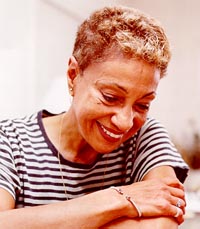 June
Jordan June
Jordan
Author
Sunrise: July 9, 1936
Sunset: June 14, 2002
"Bisexuality means I am free and I am as
likely to want and to love a woman as I am likely to want and to
love a man, and what about that? Isn't that what freedom
implies?"
"If you are free, you are not predictable and you are not
controllable. To my mind, that is the keenly positive,
politicizing significance of bisexual affirmation... to insist
upon the equal validity of all of the components of
social/sexual complexity," --June Jordan from the
Progressive.
June Jordan was born in New York City in 1936.
Her books of poetry include Kissing God Goodbye: Poems,
1991-1997 (Anchor Books, 1997), Haruko/Love Poems (1994),
Naming Our Destiny: New and Selected Poems (1989),
Living Room (1985), Passion (1980), and Things
That I Do in the Dark (1977). She is also the author of
children's books, plays, a novel, and Poetry for the People:
A Blueprint for the Revolution (1995), a guide to writing,
teaching and publishing poetry. Her collections of political
essays include Affirmative Acts: Political Essays (1998)
and Technical Difficulties (1994). Her 26th book
published by Basic Books is her memoir, Soldier: A Poet's
Childhood, in May 1, 2000 and since then has received
unanimous national acclaim.
Her honors include a Rockefeller Foundation grant, the
National Association of Black Journalists Award, and
fellowships from the Massachusetts Council on the Arts,
the National Endowment for the Arts, and the New York
Foundation for the Arts.
June Jordan, is one of the world's most
articulate and essential voices. Her work transcends traditional
bounds of self and society, expressing conscious optimism- the
unity of justice, equality and tenderness. Jordan is one of
those rare writer/activists whose greatest strength is her
ability to live what she believes.
The author of 26 books, June Jordan is the
most published African American writer in history. Ms.
Magazine (July 2000) considers June Jordan "one of
America's fiercest literary figures and social activists"
and "the hope of a generation".
Internationally celebrated for her creative
accomplishments, she is Professor of African American Studies at
the University of California at Berkeley where she directs the
enormously popular Poetry For the People program. Poetry For
the People received a Chancellor's Recognition for
Community Partnership on September 19, 2000, for reaching
out to local high schools, congregations and correctional
facilities as well as University students. Jordan has been
Professor of English at more than seven North American
universities and colleges, including Sarah Lawrence, City
College and Yale University.
Poet triumphant, Ms. Jordan's poetry is found in virtually every
major anthology of contemporary poetry. She has been included in
more than 30 collections such as the Norton Anthology of
Modern Poetry, The Norton Anthology of African American
Literature, Homegirls: Anthology of Black Feminism
and The Village Voice Anthology. The Library Journal,
January 1994, hails Ms. Jordan as, "One of the most important
poets writing today." Currently a regular columnist for
The Progressive, Ms. Jordan's essays, poems, reviews and
articles appear in a wide range of publications from the New
York Times to VIBE and from Ms. to
Transition. The perception and candor of her commentary
challenges her readers to examine their own involvement in
public life.
In September 2000, Black Issues Book Review described
Jordan as "an a-bomb" and "the consummate tough girl".
The New York Times featured Jordan on July 4th, 2000 and she
also appeared on The Lehrer News Hour in "A
Conversation with June Jordan" on August 21, 2000.
Ms. Jordan has delivered keynote addresses, commencement
speeches, major papers and readings at national and
international gatherings, innumerable colleges, universities,
and on radio and television. She has presented her work and has
been honored at the United Nations, the United States Congress,
and the Library of Congress. She is as powerful in person as she
is in print and is one of the truly remarkable women of our
time. A woman of extraordinary talent and range, June Jordan has
earned her nickname as "the universal poet."
Source:
http://socrates.berkeley.edu/~africam/jordan.html
http://www.stanford.edu/dept/AAAS/106A.html\
Streaming Audio:
Steam
I
Stream II
See Also:
The Intimate Distance of Desire: June Jordan's Bisexual
Inflections 81
Ana Louise Keating
Through an exploration of June Jordan's poetry and prose, this
essay questions contemporary definitions of bisexuality and
lesbian writing, and attempts to enact a non-binary bisexual
reading praxis. I argue that Jordan employs several tactics
including ambivalently gendered pronouns, oscillations among
apparently distinct categories of meaning, shifting referents,
and performative speech acts to resist restrictive identity
politics. These bisexual inflections enable Jordan to replace
conventional Enlightenment-based concepts of isolated,
self-en-closed identities with open-ended models of identity
formation that transform both herself and her readers. Moving
between sameness and difference, Jordan's bisexual inflections
destabilize the binary system structuring sexual, gender, and
ethnic categories, creating an intersubjective matrix
|